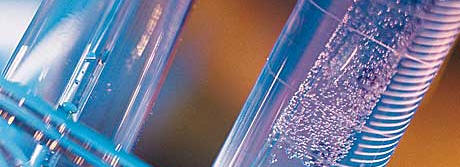
|
Eugene Dakin Ph.D., P.Chem Professional Chemist
|
|
|
|
|
Corrosion Inhibitors Corrosion Inhibitors prevent further corrosion of the metal piping and equipment in the oilfield. Some crude oils with high levels of acids are so corrosive that pipeline failures occur during only a few weeks of actual service.
If chemical corrosion in the oilfield is not addressed, the following costly items can occur: 1) reduced production, 2) unfavorable environmental impacts, 3) Cleanup costs, 4) reduced pipeline and equipment lifetime, 5) rapid replacement and construction costs, 6) High engineering bills.
Usually, low levels of corrosion inhibitors (100 ppm to 1000 ppm) are continuously injected or batched to prevent or limit corrosion on this equipment.
The following diagram displays the effectiveness of a production line with, and without a corrosion inhibitor that is producing a fluid with a high level of acid gases.
The untreated (top) line has a buildup of corroded metal which eventually causes line failure. Because of the lower line thickness and increased surface roughness, production rates decrease before failure occurs.
A line treated with a Corrosion Inhibitor forms a protective layer between the produced fluids and the outer metal lining. This action inhibits the acids from physically attaching to the line and maintains a corrosive free environment for the metal line.
Further research is being performed to chemically pretreat or chemically modify the metal matrix to lower the corrosion properties of production string metals. This is in the field of metallurgical chemistry.
Contact Eugene for more information.
|
|
| © 2006 - Eugene Dakin -
|
